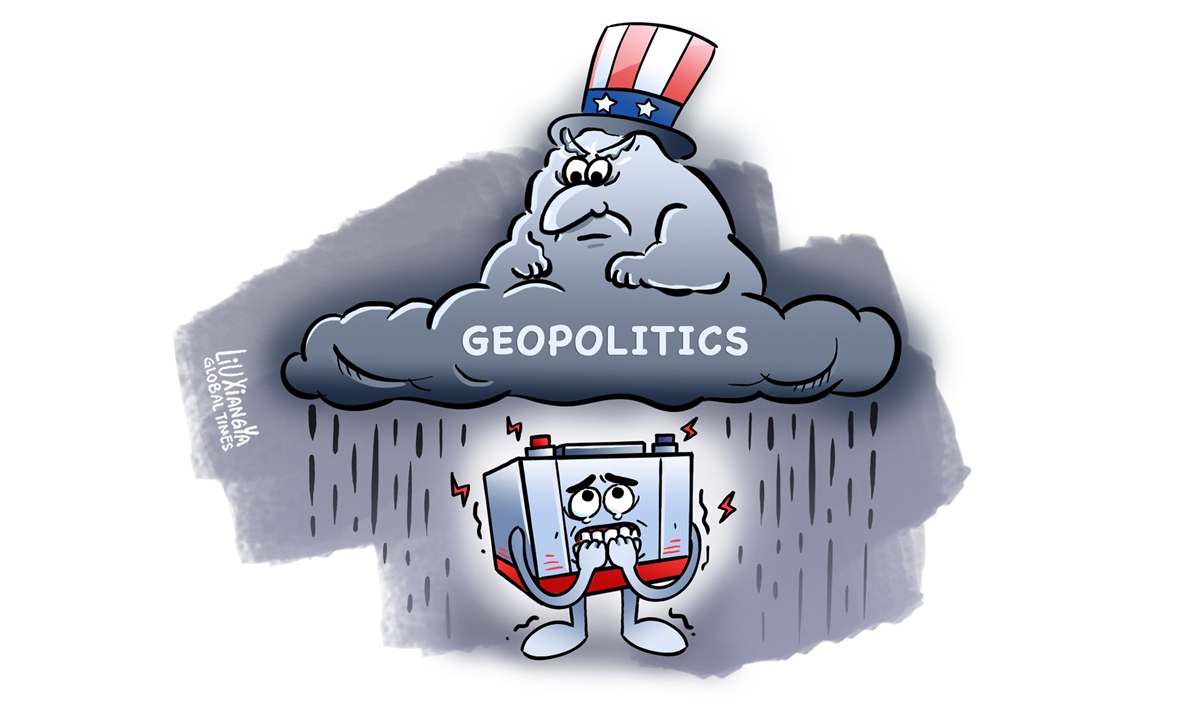
Illustration: Liu Xiangya/Global Times
The anxiety caused by declining US competitiveness has been haunting some politicians in Washington, but they will eventually realize that geopolitical games cannot help revitalize the US manufacturing sector, including the widely watched battery industry.
Two influential Democratic US senators urged the Energy Department to take steps to boost US battery manufacturing and next-generation battery research, citing "China's dominance and export controls," Reuters reported on Monday. These American politicians may not be aware that they are playing a dangerous game, in which manufacturing growth is increasingly driven by geopolitical considerations, rather than economic factors. Such strategies will distort the economy and disrupt the global industry chain.
As reported, the US holds a relatively small share of the electric vehicle (EV) battery market, accounting for only 7 percent of global EV battery production. Currently, a complex EV battery industry chain has formed globally, in which lithium and other raw materials come mainly from Australia, China, Indonesia and South American countries, while chemical processing, battery components and assembly are mostly completed by Chinese companies. If the US wants to control this industry chain, or even relocate it to the US and its allies, it will be an impossible task and obviously contrary to market laws.
As the world shifts up a gear in its transition to EVs, the demand for batteries has skyrocketed in major automotive markets in the world. Batteries account for approximately 40 percent of EV costs. The most important factors in making an electric car commercially viable are that its battery must be powerful, reliable and cost-effective. Some American politicians may hope to reshape the global battery supply chain in order to control a key part of the global EV industry. Their EV battery strategy is mainly based on geopolitical considerations, rather than a rational result of analyzing the advantages and disadvantages of the US economy.
The current global EV battery supply chain is the result of market choice. If politicians in Washington cannot help the US economy build up the competitiveness of its manufacturing sector by improving infrastructure facilities and reducing business costs, then their call to boost US battery manufacturing and next-generation battery research will become hypocritical propaganda to accumulate political capital for themselves, or a geopolitical game to hype China-related issues and promote economic "decoupling."
US manufacturing is not what it was a generation ago. With few exceptions, costs for US domestic manufacturing are significantly higher than costs for international manufacturing. If American politicians insist on carrying out localized production in the US, profitable and efficient production will be a significant and costly challenge that could slow EV adoption in the country.
The real purpose behind the US call for "de-risking" from China's supply chain is to crack down on the competitiveness of Chinese EV makers. China has been restrained and kept a low profile. But its steps forward are steady and firm. Chinese companies hold a global advantage in the EV and battery industry supply chains. While the US has made some progress in the field of new-energy vehicles, its industry chain is not as comprehensive as China's. The US will feel more and more pain if it resorts to real action to further suppress Chinese enterprises.
The US cannot contain China's economic development, not only in the field of EV batteries, but also in high-tech industries such as semiconductors and 5G. There is no denying that China is currently facing some challenges, as the US-initiated tech war creates certain difficulties in the short term, but the progress of China's independent innovation is constantly accelerating, which has enhanced the competitiveness of Chinese enterprises.
We do not oppose the idea of boosting US battery manufacturing and next-generation battery research, but such efforts should be based on mutually beneficial international cooperation rather than "de-risking" from China. If the US wants to de-risk and diversify its EV supply chain from China, and replace China's position in the global manufacturing industry chain, its efforts will be in vain.
The author is a reporter with the Global Times. bizopinion@globaltimes.com.cn




